How to get your toddler to eat?
Don't pressure!
So much easier said than done. This I know. But this is THE place to start!
Different Forms of Pressure
The formal definition of pressure: the use of persuasion, influence, or intimidation to make someone do something.Here are some ways parents turn to in an effort to get their children to finish their meal.
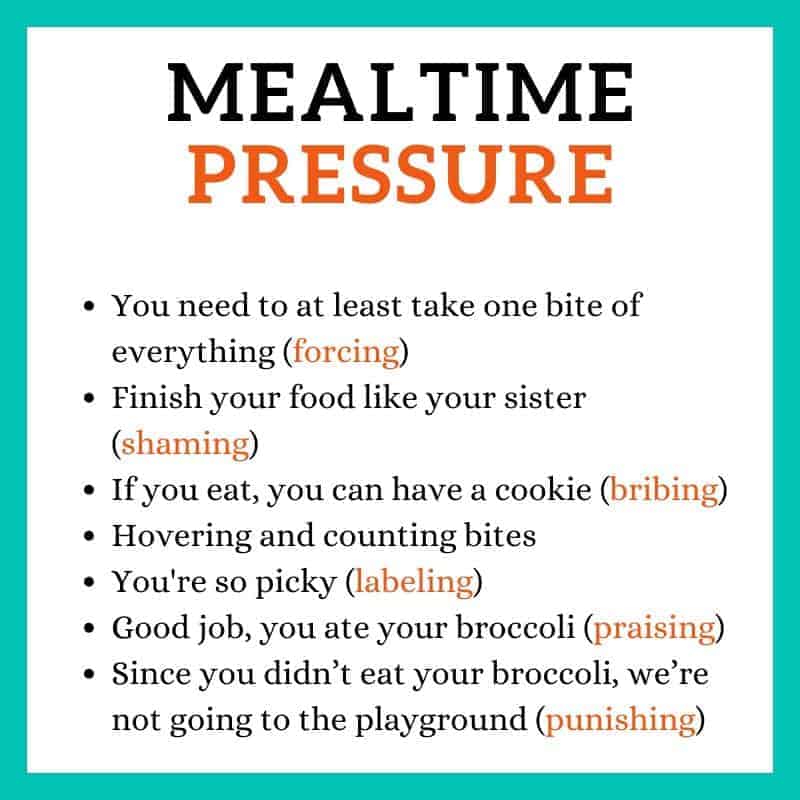
What's wrong with pressuring?
It doesn't work!!
While your child may respond to your pressure and eat a bit more, this is only a temporary solution. And it can have negative, lasting effects on not only their health but on their lifelong relationship with food.
- Eating no longer becomes an enjoyable experience. Your child can develop negative associations with the food and learn to dislike or avoid the food altogether. I always like to encourage parents to draw from their own experiences!
Perhaps you were forced to eat a certain food(s) growing up. What are your feelings towards that food now? Maybe you’ve learned to enjoy it over the years. Maybe not. But something tells me those negative memories surrounding the food haven’t been completely erased from your mind
In fact, according to this retrospective study, college students who remembered being pressured to eat as kids continue to dislike the foods that their parents forced them to eat. Furthermore, they reported that given the choice, they would avoid these foods today.
- Your use of pressure can undermine your child’s innate ability to self-regulate their food intake. They may ignore their hunger and fullness cues and eat more to earn your approval. Even though their body and brain are telling them that they’re full, they won’t stop until their plate is cleaned.
Again, if you were forced to clean your plate as a child, you can probably relate to this. On the flip side, they may eat less than what they’re hungry for in defiance and further fuel their picky eating.
- Your child will learn to use food as a means of asserting their independence, which will only promote mealtime battles.
Why you shouldn't praise your child
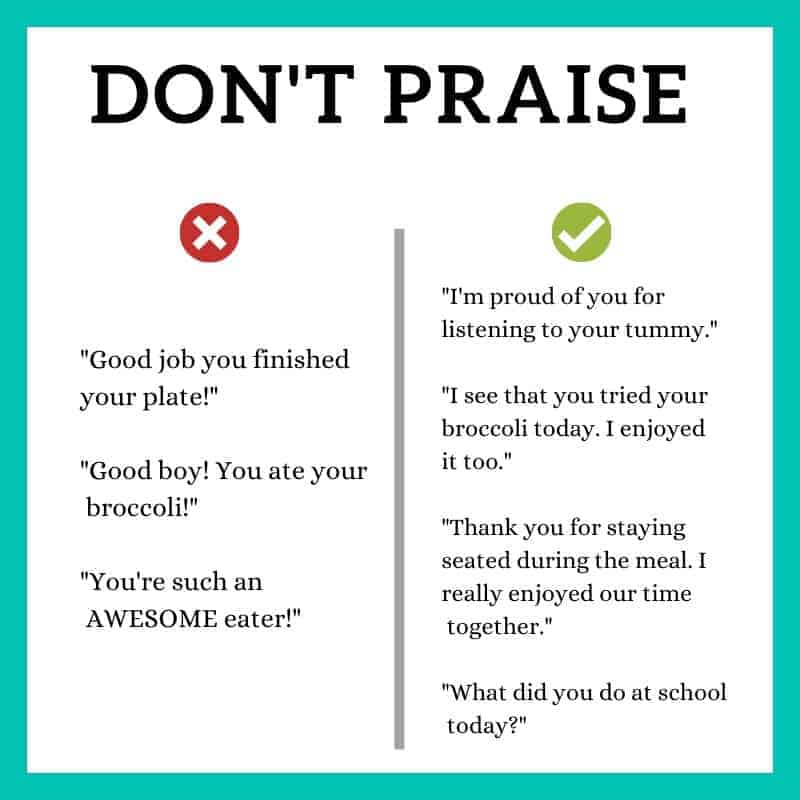
“Good job! You finished your plate tonight!”
I want to take a moment to elaborate a bit more on why you shouldn’t praise your child for eating as it is a source of confusion for a lot of parents. Isn’t praising your child a good thing? Won’t it reinforce them to repeat the desired behavior?
If done correctly, praising our children can do wonders for their self-esteem and confidence! However, when it comes to eating, it’s best to avoid it.
WHY?
Your child may learn to value how much they eat more than following their appetite. If your child is a pleaser, they may override their hunger and fullness cues in order to please you.
On the other hand, if your child is an autonomy-seeker, they may take it as pressure and shut down completely. Your child may also start thinking that eating xyz or eating more makes them a good boy/girl.
Meal time and eating is not a performance. I’m going to assume that you wouldn’t praise your child for eating a cookie or ice cream. If you praise them for eating their broccoli, for example, you’re teaching them that some food are good and some are bad.
This can truly damage their relationship with food. You want to put ALL foods on a level playing field.
What should you do instead?
Instead, of looking through your short-term lens -“I just want my child to eat now!”, I highly encourage you to think long-term and consider:
“How can I help my child become a joyous, mindful eater who has a healthy relationship with food? How can I make their eating experience less scary? more safe and fun?”
Trust your child from the very beginning!
Trust their innate ability to self-regulate and that they know more about their eating than we do. Give your child the opportunity to listen to their body and eat based on their natural appetite, not external influences of how much and what they should eat.
Reframe your mindset from getting your child to eat (which is not your job) to serving well-balanced meals and enjoying and exploring food together.
That means, don’t come to the table with an agenda. Instead, focus your efforts on setting mealtime structure and limits. Teach your child what is appropriate to do and not do and allow them to exercise their independence within those limits
Check portion sizes. Oftentimes, our desire to see them grow can make us forget how much smaller their tummies are.
Keep the language neutral.
Instead of saying, “Ugh! You are not eating your broccoli again! (in an angry voice)” say “Mommy’s really enjoying her broccoli today. Could you share?” Don’t forget role modeling is SO powerful. Lead by example. AND also remember that seeing and touching all count as exposures!
Instead of saying “Good job! You ate your broccoli!” say “Looks like you’re enjoying your broccoli today.” Simply acknowledging in a neutral manner will encourage your child to try it again.
Better yet, don’t even talk about the food. There’s no need to comment on what your child is or isn’t eating. Instead, use mealtimes as family bonding time. Talk about the things you guys did earlier in the day, the books you read, what they learned at school, etc.
Other Resources
- Is my toddler turning into a picky eater?
- Positive parenting when your toddler won't eat
- Help! My toddler won’t eat!
- What to do when your child won’t eat dinner
- My child only wants snacks
- How to help your underweight child
To Sum
The less pressure you put on your child, the better. Don’t take their refusal to eat personally. It’s easy for us, as parents, to feel guilty and blame ourselves.
We start to question everything. Am I serving the “wrong” food? Is it because my food isn’t tasty? I want to remind you that your child’s refusal has more to do with testing limits, exerting independence, and fear of trying new food (food neophobia peaks between 2-6 years of age) than the food itself.
While it’s hard not to worry during this time when eating just seems all over the place, know that your child’s appetite and eating behaviors will level out over time.
Remain calm and stick to your mealtime structure. Your child may not eat with the gusto you wish they would for a while, but doing so will go a long way in helping your child establish healthy eating habits. Not to mention, your times around the dinner table will be that much sweeter!

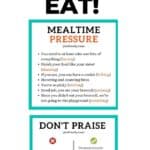
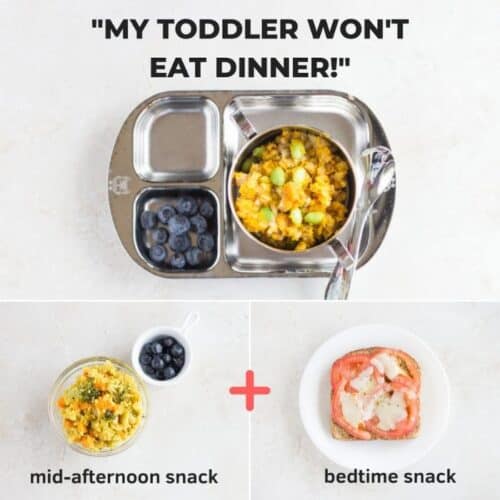
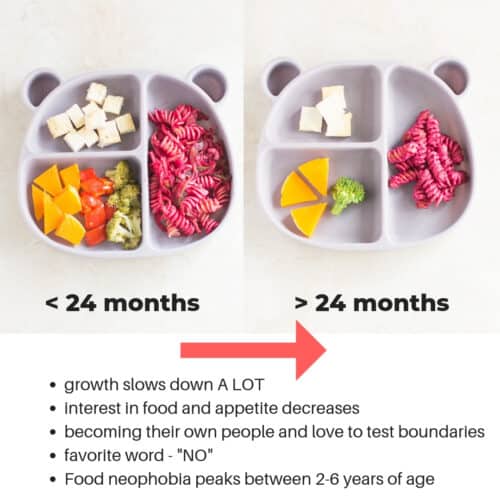
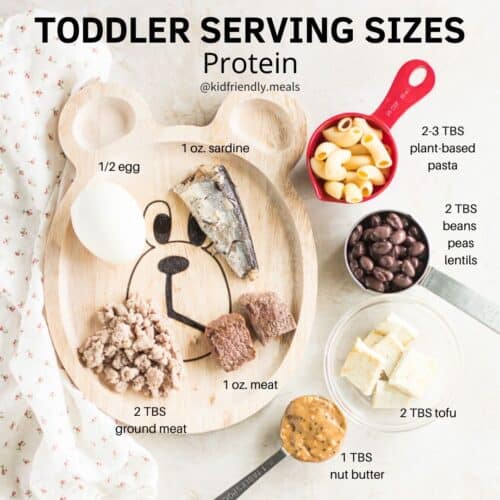


Jenny says
This is really helpful! Do you have any advice on to how to explain to grandparents the importance of not commenting on food/not creating meal pressure, especially if it is a very engrained cultural pattern? I am Korean American and I feel like mealtime pressure is huge from growing up, I really don’t want to pass that on to my child, but I’m worried that when I visit my family they will do this to him and I don’t know how to explain to them why they should not.
Mary says
To add to that question - what if they only want more of the item they like and continues to steer away from the other items ? My dtr is 15 m also and she continues to ask for more cheese- points for fridge that’s within view of the dining table asking “more”
Do we just give them more of what they want ?
Min says
A great question! So if she's asking for more of what was originally served on the plate, then give more. Now, what you don't want to do is give her something completely diff from what was served bc then she'll learn to reject her plate completely knowing that she'll get what she wants instead. Def don't want to go down that path bc then you'll soon find yourself as a short order cook. Going back to the question, even if she only wants cheese (was part of the meal) and doesn't touch anything else, then as hard as it may be consider it a win that she was exposed to all the foods that were on the plate even though they didn't actually get eaten. Every single exposure counts and the more she sees the foods in question, the more they become safe and less scary. Check out my blog post on repeated exposure for babies and toddlers. Sorry this is getting quite long, if your child is obsessed with cheese, then you don't have to serve it at every meal. Remember, we are in charge of what to serve. Hope this is helpful!
Sarah says
So what is the best approach when they don’t want to eat what you served (if you made sure to include one thing they like) or if they hardly eat anything and say all done . Just end the mealtime ? Try again in 30 minutes? Just hate the feeling of sending to bed hungry but I guess if they were hungry they would eat. Do Serve milk with meals or water ?
Asking for a 15 month old
Min says
Hi Sarah! It's especially difficult when they refuse dinner, isn't it? First, I would encourage you to consider their whole day's intake, even several days. Their appetites fluctuate and they're not growing as rapidly compared to when they were babies so don't be alarmed when you see a drop in intake. As hard as it may be on mama's heart, if he does refuse, even when you did offer foods he enjoys, then yes, end the meal. If you're following a mealtime schedule, he will know he'll get a chance to eat in the morning. Now, if he's constantly refusing dinner and is saying he's hungry before bed, then it may be a good idea to add a bedtime snack (and be consistent with it! So offer every single day). Do check out my earlier posts that I mention here - like "help! my toddler won't eat!"
Kathleen says
Thanks for the response! I have a 5 month old but I am thinking ahead of how to adjust meal time as my daughter gets older as I had all the pressure statements at the table! So if they don’t eat or refuse, don’t comment but if there is a bedtime snack, have that available, something like veggies maybe? When they are hungry they will eat? I just want to make sure I am understanding for when we get to this phase! Thank you!
Min says
Yes, great bedtime snacks are anything that won't excite your child too much. They should be similar to what you serve during mealtimes. That way, they won't learn to hold out on dinner to make room for the fun foods. I always recommend incorporating some sort of protein/fat source to help with satiety. So if serving veggies, then pairing with some nut butter, yogurt, mashed avocado, etc. If they still reject the snack then you say, ok I see that you don't feel like eating your dinner or snack tonight. You'll have another chance to eat tomorrow! Say it in a gentle but firm way. Your child may go to bed very hungry. But there's an important lesson to be learned there too. They will remember next time what that felt like and just might surprise ya by doing things differently 😉